Utah Consumer Privacy Act (UCPA) Explained
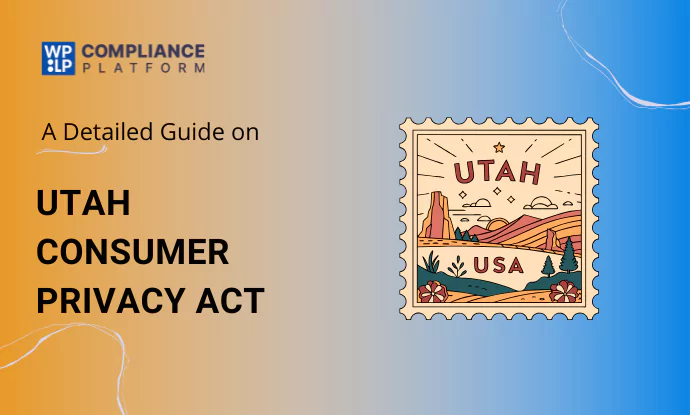
Summary
However, businesses are given a 30-day cure period to address any violations before the Attorney General can take legal action. To avoid these penalties, companies must ensure they follow the law by providing clear privacy policies, respecting consumer rights, and properly managing personal data.
With digital privacy becoming an increasing concern across the United States, Utah is no exception. In 2022, it became the fourth U.S. state to pass a comprehensive data privacy law — the Utah Consumer Privacy Act (UCPA).
The law came into effect on December 31, 2023. The UCPA defines rules for businesses to comply with UCPA requirements. If you fail to comply, you will likely face penalties, which will further damage your company’s reputation.
So it’s advisable to have a perfect execution of all the legalities that the company needs to abide by.
This guide will provide you with all the details on how to go about the UCPA law and will focus on compliance with the act.
Let’s move further and explore the law together.
What is the Utah Consumer Privacy Act (UCPA)
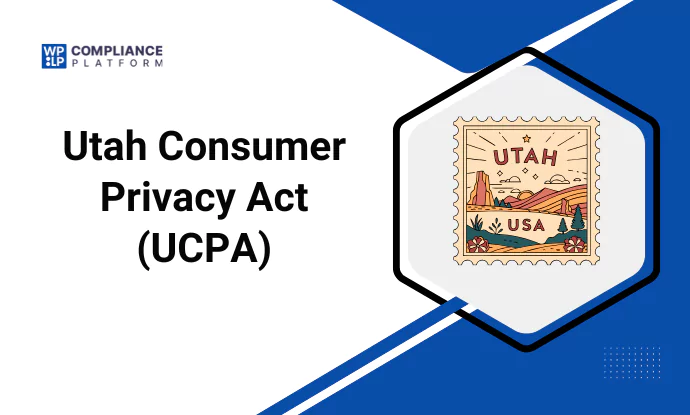
The UCPA law serves to safeguard Utah residents’ data security and privacy. According to the law, the data that business entities gather, process, and disclose must be consented by the user.
The UCPA also commits companies to providing transparency and protective measures against personal data integrity, confidentiality, and availability.
Compared to California’s CCPA and Virginia’s CDPA, the UCPA is more business-friendly, featuring narrower definitions and imposing fewer compliance obligations on organizations.
Like other data privacy laws, UCPA also gives consumers the right to:
- Request access and deletion of the data held by a business.
- Opt out of collecting and using their data for targeted advertising or sales.
- Receive a copy of their data in an easily transferable, usable, and portable format.
The legislation also makes it mandatory for organizations to share personal data openly.
In addition, the UCPA seeks to weigh consumer privacy rights against business practical requirements. Enforcement of the act falls within the responsibilities of the Utah Attorney General’s Office in partnership with the Division of Consumer Protection.
Next, look at who must comply with the UCPA law.
Who Must Comply With the Utah Consumer Privacy Act
The Utah Consumer Privacy Act outlines how companies manage the personal information of Utah residents. But not all businesses are covered by it. To ascertain if your company is required to comply, you must come under one of these categories:
- Annual Revenue of $25 Million or More
- Your business must generate at least $25 million in annual revenue, even if that revenue does not come directly from Utah consumers.
- Controls or Processes Data of 100,000+ Utah Consumers Per Year
- It includes any business that collects, stores, uses, or shares personal data of 100,000 or more Utah residents annually, whether or not those individuals are customers.
- Derives over 50% of Revenue from selling the Personal Data of 25,000+ Consumers
- If your business makes at least half of its revenue from the sale of personal information of 25,000 or more Utah consumers, it falls within the scope of the law.
Note: Nonprofits and government entities are exempt.
What are the Consumer Rights Under the UCPA Law
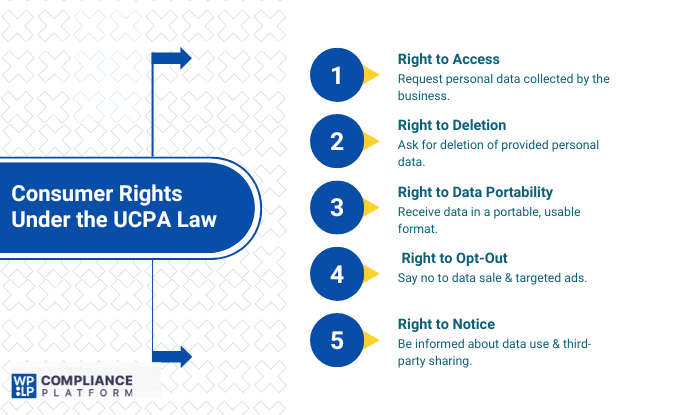
The Utah Consumer Privacy Act provides consumers with five rights. It gives Utah citizens control over their data and promotes trust in how businesses collect their data, share it, or sell it. It provides transparency and control over their data.
Below are the rights granted to consumers under the UCPA regulations:
- Right to Access: Consumers have the right to request access to the personal data a business has collected about them.
- Right to Deletion: Consumers are entitled to have personal data submitted to the business deleted.
- Right to Data Portability: Businesses are required to give consumer data in a portable and easily usable format when asked.
- Right to Opt-Out: Consumers have the right to opt out of:
- Sale of personal data to third-party
- Targeted advertising
- Right to Notice: Companies need to inform consumers regarding:
- The types of data that are collected
- Companies need to declare how they are utilizing the data explicitly
- Any third parties that are part of the data processing
These rights give Utah residents meaningful control over their data and require businesses to operate transparently and be accountable for the user data.
Companies should ensure compliance with these rights via privacy policies, user interfaces, and cookie banners.
How Businesses Can Comply With Utah Consumer Act Regulations
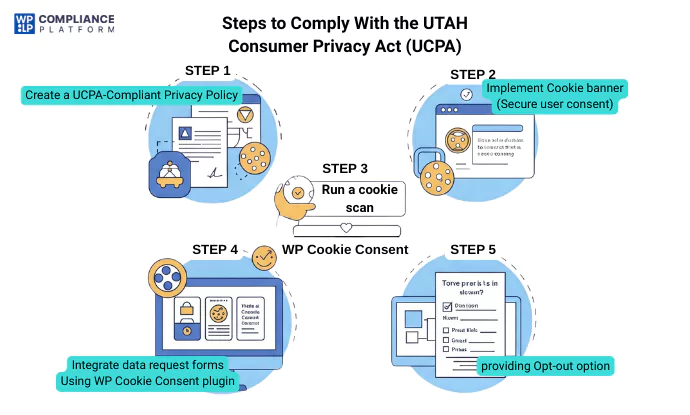
It is essential to make your website or business comply with Utah Consumer Privacy Act requirements so that you do not have to pay any penalties or fines, and people trust your organization. You can take several key steps to do so. Some of them are:
- Generate a privacy policy that shows the resident how their data is handled and collected by the organization, and what they can do to know about their data.
- Websites should respect universal opt-out mechanisms (UOOMs), such as GPC, as a verifiable method for users to fulfill their opt-out rights.
- Follow the data minimization that ensures that only necessary data is collected and no unnecessary data is collected.
- If you can do all these, you can also hire a data privacy officer to oversee UCPA compliance and maintain internal privacy protocols.
You should also ensure that you have two or more ways to fulfill consumers’ privacy rights by offering them a data subject access request (DSAR) form, a cookie consent banner, or an active email address to reach out to.
To help your business comply, you can use the WP Legal Pages compliance platform, privacy policy generator, and consent management platform.
To help your business comply, you can use the WP Legal Pages compliance platform, privacy policy generator, and consent management platform.
Below, we have mentioned details on how to use this plugin to make your business UCPA-compliant.
Generate a privacy policy that complies with UCPA using WP Legal Pages.
You can create a privacy policy using plugins like WP Legal Pages, which instantly creates a Utah Consumer Privacy Act compliance privacy policy. It takes less than 5 minutes to generate.
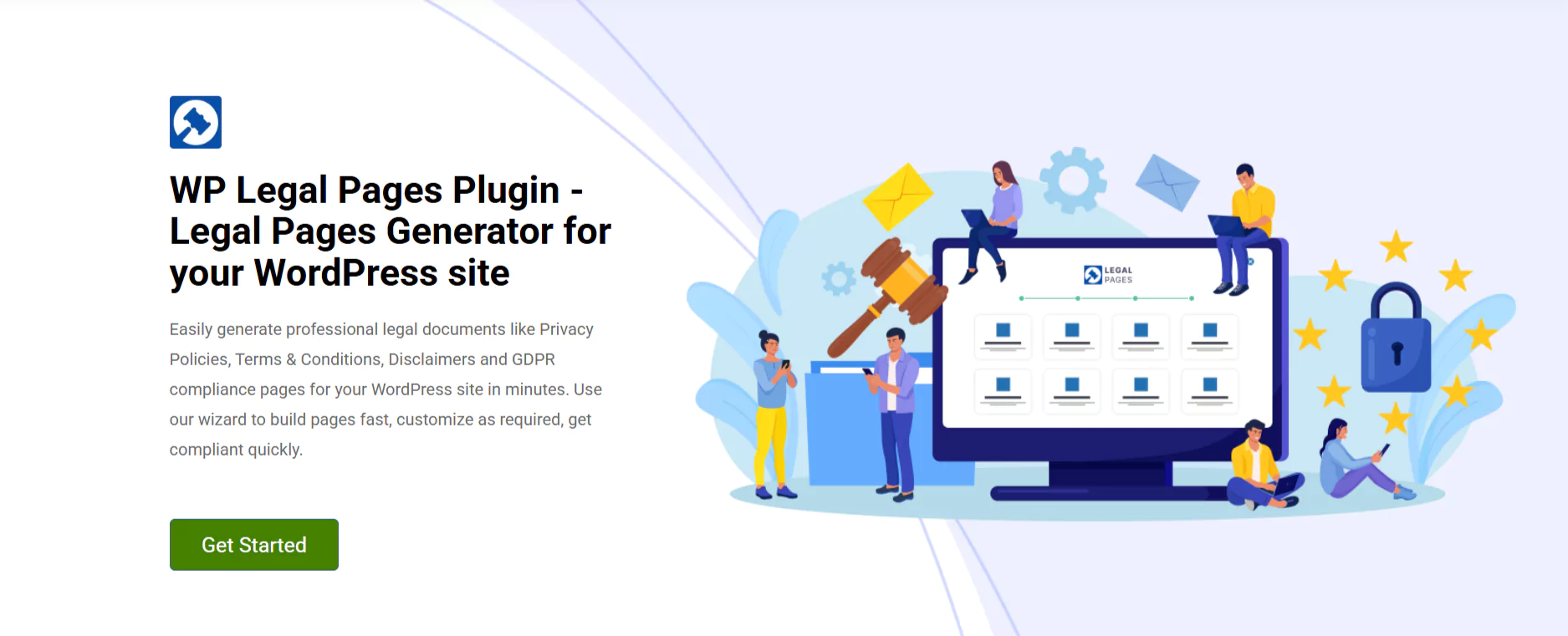
The plugin provides step-by-step instructions for editable legal forms and provides pre-built clauses. You can select consumer rights, data types, and opt-outs according to the UCPA requirements.
Begin by installing the WP Legal Pages plugin through the dashboard and starting the Privacy Policy Wizard. Enter your business-specific information, and personalize any clauses as appropriate.
You can change the information in it, such as contact details, data types, business names, and privacy policies, to make it represent your actual operations.
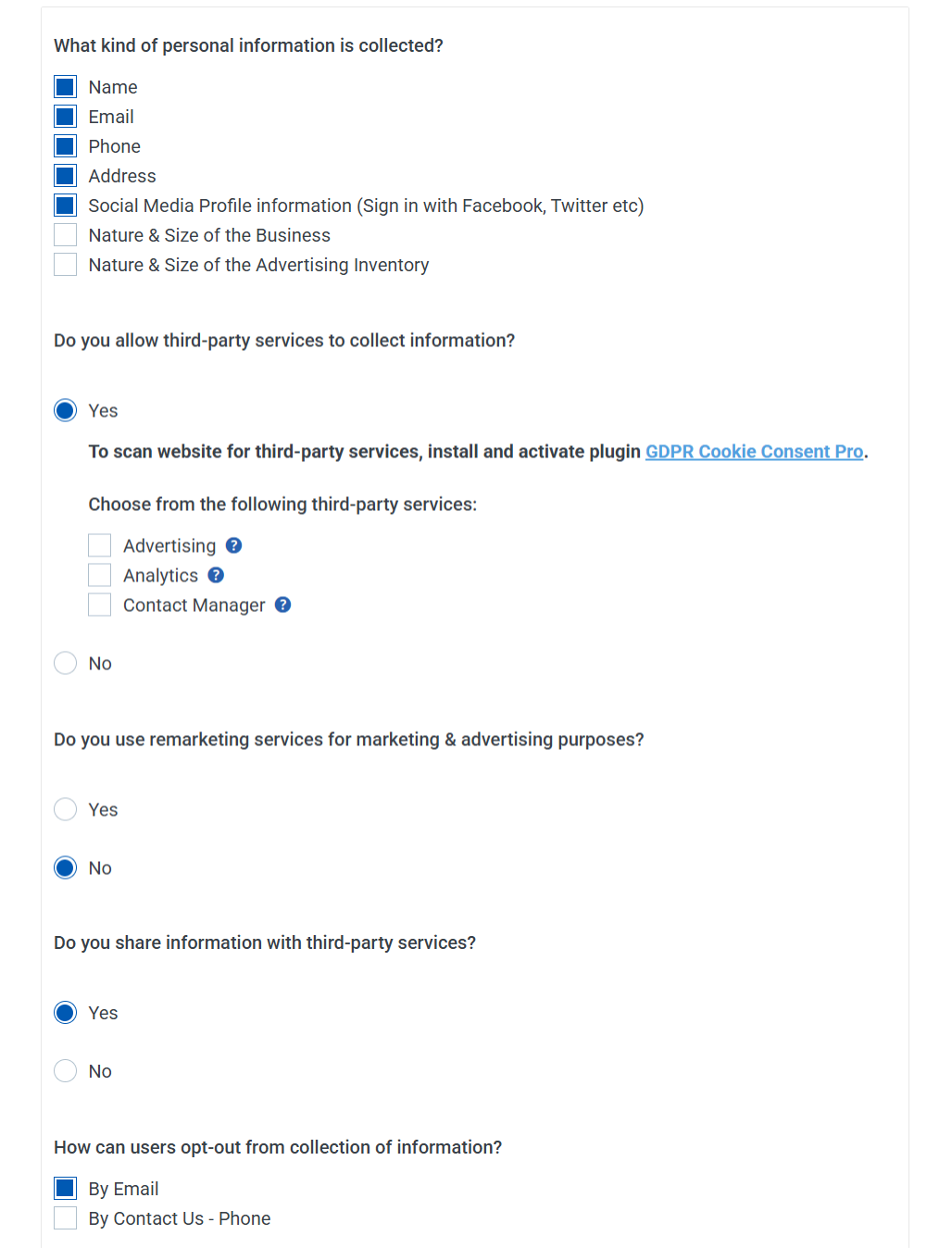
Click “Publish.” Your policy becomes live instantly.
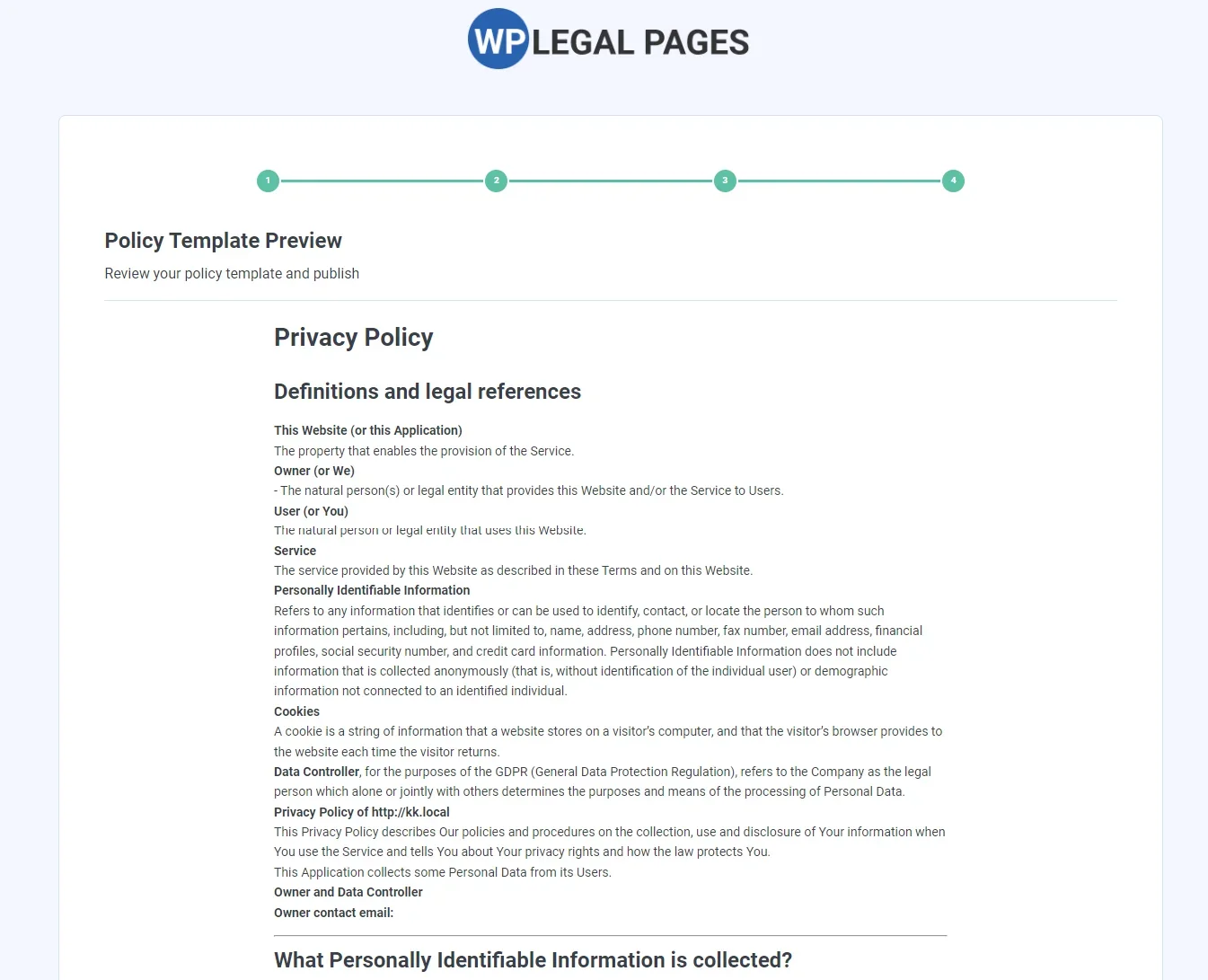
Through this, you are able to provide fairness and clarity to the citizens of Utah according to the Utah Consumer Privacy Act requirements.
Add Cookie Banner Using WP Cookie Consent
Install WP Cookie Consent plugin to show a cookie banner, inform users of tracking technologies, and provide an opt-out option for non-essential cookies.
To make use of the cookie banner, first, you need to install the WP Cookie Consent from the dashboard. Choose a pre-made banner from the options or create a custom one. Customize the changes according to the UCPA law. Enable the banner and save the settings to make it live on your website.

It is also possible to perform a cookie scan to identify all trackers on your site and provide complete disclosure.
You can refer to this tutorial for easy installation.
Add Data Request Forms to your website.
Under the UCPA, you have to make provisions so that users can request access and deletion of the data.
You can fulfill this requirement by including request forms on your website. These types of forms reflect your company’s focus on user privacy and legal responsibility and enable users to trust your business.
The WPLP Compliance Platform also helps users manage DSAR.
Following UCPA law is not only about avoiding penalties or fees but is also about building trust with customers and making your business lawful.
Utah Consumer Act Penalties and Fines for Non-Compliance
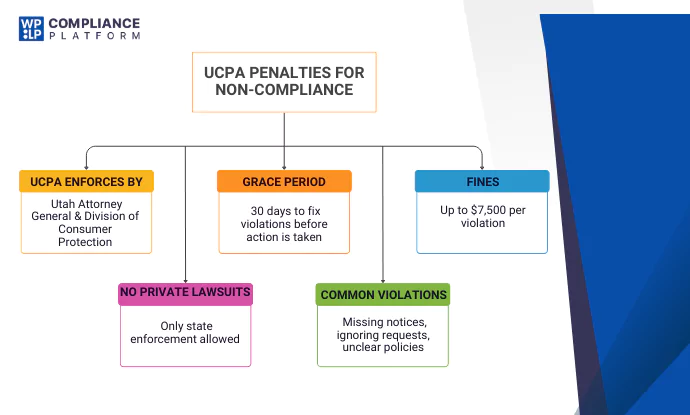
Businesses or people who do not comply with the Consumer Act face significant legal consequences.
The law allows the Utah Attorney General to investigate and enforce violations in coordination with the Division of Consumer Protection.
Here’s how enforcement works:
- After receiving a notice, the business has 30 days to correct any alleged violations during the designated “cure period.”
- If the business fails to resolve the violation within 30 days. The Attorney General can impose up to $7,500 civil penalties for each violation.
- Violations may include failure to provide proper privacy notices, ignoring consumer rights requests, or improperly selling or sharing customers’ data.
Although the UCPA does not permit private actions, the reputational damage and penalties are high enough that active compliance is highly recommended.
Tip: You may employ WP Legal Pages and WP Cookie Consent to avoid risks and to be entirely in compliance from day one.
FAQ
The Utah Consumer Privacy Act provides Utah citizens control over personal data, access rights, rights to delete, and the right to opt out of selling and using data to advertise their information. It outlines how companies manage the personal information of Utah residents.
The UCPA law covers any company that acquires, retains, or makes available the personal data of Utah citizens. The UCPA is considered more business-friendly than similar laws in other states, but still enforces meaningful safeguards for consumer privacy.
The UCPA applies to businesses or entities that provide services to Utah residents or do business in Utah. Or even if they meet one or more of the following thresholds:
a. Have annual revenue of $25 million or more
b. Control or process the data of 100,000+ Utah consumers per year
c. Derive over 50% of revenue from selling the personal data of 25,000+ consumers
The penalties for non-compliance can include:
a. Up to $7,500 per violation
b. The law grants businesses a 30-day cure period before the government takes legal action.
To make your business UCPA-compliant, you can follow these key steps.
a. Generate a UCPA-Compliant Privacy Policy: Use plugins such as WP Legal Pages to quickly generate a UCPA-compliant privacy policy.
b. Implement Cookie Management: Install WP Cookie Consent to display a cookie banner, notify users about tracking technologies, and offer an opt-out for non-essential cookies.
Conclusion
As data privacy laws continue to change, the Utah Consumer Privacy Act (UCPA) establishes a perfect way for Utah citizens to protect their data from being misused and a precedent for how businesses need to treat sensitive information in a secure, transparent, and respectful way.
These rights give Utah residents meaningful control over their data, and companies must ensure compliance through transparent privacy policies, cookie banners, and user-friendly interfaces.
Using tools such as WP Legal Pages to create UCPA-compliant privacy policies automatically and WP Cookie Consent to handle tracking technologies simplifies compliance with laws without increased complexity.
Begin preparing today so that your website complies with the UCPA regulations now and in the future.
If you like this article, you might also like:
- Delaware Personal Data Privacy Act – Easy Compliance Guide
- An Overview of Indiana Consumer Data Protection Act
- Michigan Personal Data Privacy Act – How to Comply
Need help complying with the UCPA? Simplify the process with the WP Legal Pages Compliance Platform — your easy solution for meeting Utah’s new data privacy requirements.
